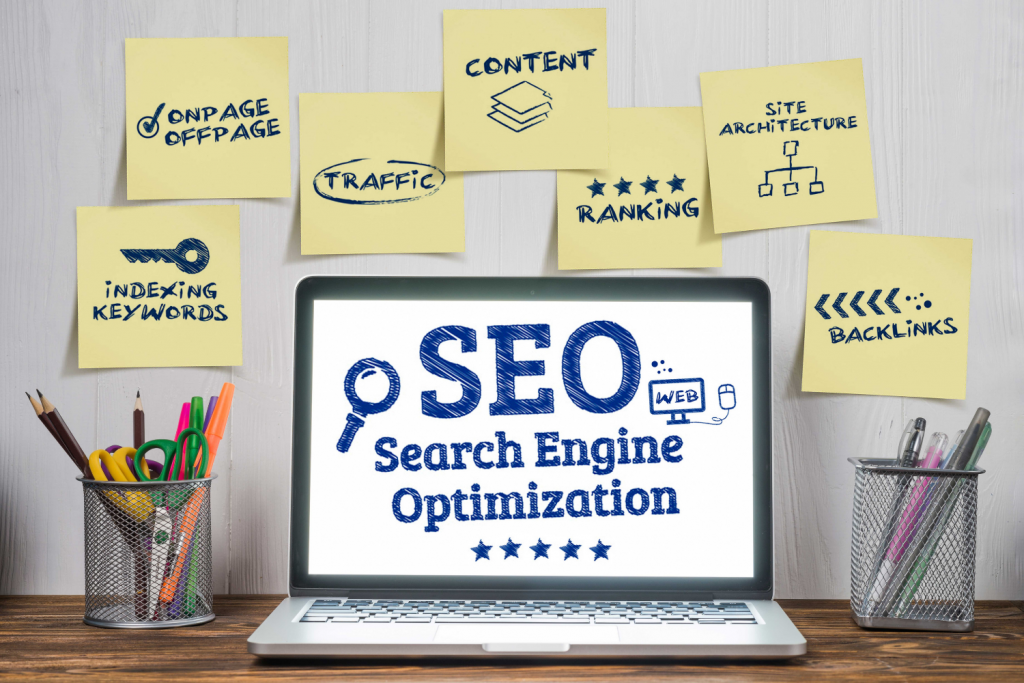Rank higher organically...
You’re likely here because of one or more of the following reasons:
• You can’t find your website on the search result pages.
• Not sure what happened to your website traffic lately
• Leads and calls have declined
• You’re starting a new website and want to ramp up new business quickly.

Our SEO features:
Organic Search Traffic
INCREASE ORGANIC SEARCH TRAFFIC
From crafting excellent content for your blog to finding the right keywords to target, Frontline Web Consulting has the expertise to help you increase organic search traffic to your website.Visibility
INCREASE VISIBILITY
If your website isn’t ranking near the top of the page in search results, you’re probably missing out on a lot of opportunities. We have proven strategies for improving search engine visibility that will make sure your site isn’t getting lost in shuffle.Optimization
HIGHER TRUST AND CREDIBILITY FOR YOUR WEBSITE
Using tactics like optimizing titles, meta descriptions, and making your site more relevant to your potential customers by providing credible content, will make your website more visible on search engines.Our specialities

Content Optimization
Your content is probably amazing, well written, authentic, and comes from the bottom of your brand, but… is your content optimized for ranking? Quality content and SEO go hand-in-hand.
Let’s analyze and optimize your website content, adds essential keywords and phrases so your customers find you organically, and we fix broken links. Increasing the relevance of your business and boosting your services are now possible through Content Optimization!
Blog Writing
Distinguishing yourself from your competitors, displaying a unique personality, offering an informed decision about your services or products, and creating a real impact on your customers are reasons enough to have a well-produced blog.
Frontline Web Consulting connects and understands your field of work to create high-quality blog content for your website! We plan, prepare and share articles that drive traffic to your website, place your business higher through the best SEO (Search Engine Optimization) practices, and cultivate solid relationships with your customers.

Search Engine Optimization FAQS
Search Engine Optimization (SEO) is the practice of using on-page and off-page tweaks and tactics to ensure that your page ranks higher on search engines. Yes, you should invest in SEO for your company. Search engine optimization (SEO) is a method of increasing website traffic. If you rank organically, you will have 24/7 visibility.
Increasing your website rankings are very beneficial for your business. It creates awareness and organic traffic to your website, which can generate more leads and sales.
Google uses over 200 ranking factors, and these allow the search engine’s algorithms to rank websites based upon the relevancy and authority of their pages. As Jason Barnard comments:
“Google is striving to recommend the most relevant answer from the most trustworthy source in the most appropriate format for its user.”
To succeed at SEO, you need to ensure that your content is the most relevant result for a specific search query and that your website is seen as a trustworthy source.
It depends, ranking your website on search engines like Google doesn’t happen overnight. Long gone are the days of launching a website, optimizing your title tags, and ranking in a few weeks. You can’t launch a website and expect it to rank for competitive search queries overnight. It takes time for a website to perform organically as Google ranks relevant sites that have built up authority. In SEO, you need to earn your ranking position on Google and you need to deserve to be there.
It could take only a few months or it could take a year to rank for your preferred keywords. This is very much based on the level of resources you allocate to your strategy, the level of competition, and what others who compete for the same queries are doing. Each industry and goal is different.
For example, It might only take a few months to rank for a local term (e.g., plumber in [location]), whereas it could take years to rank a new website for, let’s say, the term “laptops.”
Keywords are the words and phrases that searchers use – usually on a search engine. These are the words that we use when looking for pages, images, videos, blogs, any kind of information or content on the web really. These keywords need to be strategically inserted into your pages and content.
A blog is the most commonly used platform for sharing marketing content. This is because blogs appeal to consumers by providing them with entertainment and relevant information. It also helps you rank on Google and with your SEO strategy.
Blogging can be used for literally any business – from a local fashion boutique to a law firm, to a construction company. So in a nutshell, yes, we definitely recommend having a blog.
Here’s the breakdown of the things that need to be done to get your website to show up on SERPs (search engine results pages):
- Ensure these search engines understand who you are and what you offer.
- Convince them that you are the most credible option for their users.
- Make your content deliverable.
These three things are the foundation of the SEO strategy we put together for you.
If you don’t see any of your website’s pages listed when you search in Google, it may mean that it has not been indexed. Reasons for this could include:
Your website is blocking search engines from crawling it (usually in your robots.txt file) or is instructing them not to index it (generally using noindex tags). Resolve these blocks, and you should see your site indexed.
Your site has launched very recently (within a few days), and you have not submitted the site to Google or linked to it from anywhere, meaning it hasn’t yet been indexed. Set up Google Search Console and request indexing.
Your site has received a sitewide manual penalty for violating Google’s Webmaster Guidelines. This is rare and unlikely. However, you would need to have been using some seriously black-hat SEO tactics for this to happen.
First you need to determine whether your website’s organic traffic has dropped suddenly or gradually over time.
If it has happened suddenly, it could be an issue with your website being indexed, a problem within your Google search console, or your site may have been impacted with a manual action.
If it has happened gradually, it may be that Google has rolled out a core algorithm update that has seen other sites gain traffic and rank above ours or the more likely reason is that your competitors are rolling out a more aggressive SEO strategy than you are and they’ve overtaken your organic visibility. In short, they’ve earned some of the rankings that you previously held.
A question that’s always asked is whether a business should invest in the organic searches or paid searches.
In an ideal world, a business should balance multiple marketing channels to avoid a reliance on any single source of traffic (and conversions). But, especially for smaller businesses, budget is often a challenge, and resources must be allocated efficiently. Funds aren’t endless.
Even in this instance, it’s essential to balance a long-term SEO strategy with a small but targeted PPC campaign.
While often used interchangeably, on-page SEO and technical SEO are not the same.
We can see the table below to compare these two different areas:

Ultimately, on-page SEO covers your page’s content, meta tags, images, and the like. Think of these as the page elements that are visible to users.
Technical SEO, on the other hand, is all about how Google crawls and indexes your site. Think things like site speed, structured data, canonicalization, XML sitemaps, hreflang, and more.
